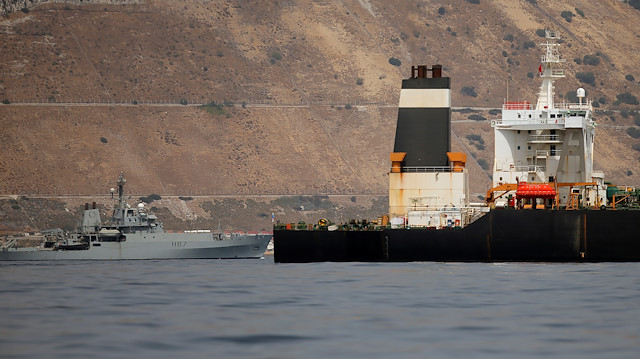

File photo
Will not barter ship that was detained legally with a ship that was detained illegally, says foreign secretary
The U.K. government ruled out Thursday exchanging a detained Iranian oil tanker in Gibraltar with a British vessel seized by Iran in the Persian Gulf.
Foreign Secretary Dominic Raab said his government would not negotiate with a state that does not uphold international laws and will not allow Iran to escape international criticism of its illegal actions.
“We are not going to barter. If people or nations have detained U.K.-flagged illegally then the rule of law and rule of international law must be upheld,” Raab told Sky News during a summit in Thailand.
“We are not going to barter a ship that was detained legally with a ship that was detained illegally. That’s not the way that Iran will come in from the cold,” he said, adding that “so I am afraid some kind of barter or haggle or linkage is not on the table.”
During an interview with Sky News on Tuesday, Iran’s Ambassador to the U.K. Hamid Baeidinijad said if the U.K. releases the Grace 1 tanker then Iran would be more than willing to release the Stena Impero currently detained in the Iranian port of Bandar Abbas.
But he said the incidents in the Mediterranean and the Persian Gulf were two separate issues that needed to be resolved separately.
"Of course one issue can help resolution of another issue but these are two separate issues that need to be tackled separately" he said. "We're very keen to see the U.K. is doing all the measures necessary to release as soon as possible the Grace 1.”
Baeidinijad reiterated the Iranian government’s stance on why its forces seized the British flagged tanker, saying that the vessel supposedly collided with a fishing boat, damaging it and injuring the fishermen inside.
On July 20, the Stena Impero was seized by the Islamic Revolutionary Guard Corp. According to then-Foreign Secretary Jeremy Hunt, the tanker was surrounded by four vessels and a helicopter and was rerouted to Iranian waters. Although the ship is U.K. owned, none of the 23 crew members are British.
A second ship, the Mesdar, which is Liberian flagged but managed by a British company, was surrounded by 10 speed boats and is believed to be escorted to Iranian waters but the foreign secretary said the location of the ship is unclear.
On July 13, a British warship prevented three Iranian navy vessels from obstructing the course of a British tanker exiting the Persian Gulf. The government accused Iran of breaching international law as the tanker was not in Iranian waters.
Moreover, the U.K. dispatched a second warship to the Persian Gulf to support U.K. forces in the region and to ensure the safety of British commercial ships.
Royal Navy marines and commandos boarded the Syria-bound Iranian oil tanker July 4 in Gibraltar, preventing the vessel from entering the Mediterranean.
Iran demanded the release of its crew and vessel, accusing the Royal Navy of piracy and threatened London of retaliatory measures, rhetoric that is raising tensions between the two nations in a region already inflamed with war and brinkmanship with the West.
#British vessel
#Foreign secretary Dominic Raab
#Gibraltar
#Iranian oil tanker
#government
#UK

